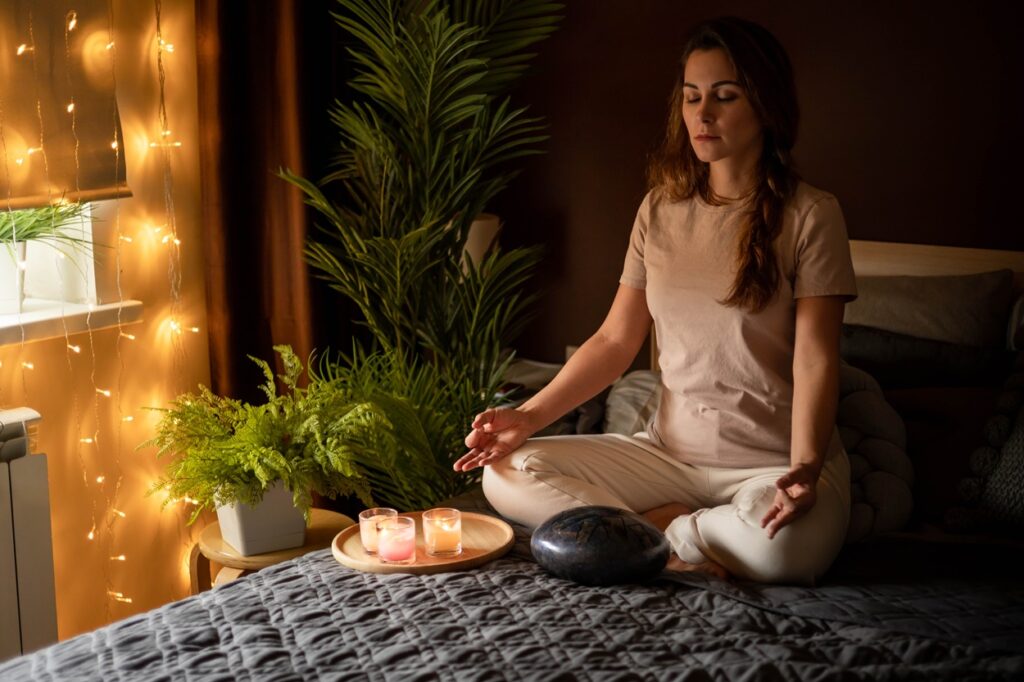Sleep with Bedtime Meditation:
Sleep is not just a period of rest, but a nightly journey that has the power to rejuvenate the mind and body. In our modern, high-speed world, where the boundaries between day and night often blur, the quest for quality sleep has led many to the ancient practice of bedtime meditation. This blog post delves into the intricate relationship between meditation and sleep, offering a guide to embracing this practice for a night of peaceful slumber.

Understanding Bedtime Meditation
Bedtime meditation involves engaging in meditation practices shortly before sleep, aimed at relaxing the body and mind to prepare for rest. It can encompass a range of techniques, from guided visualizations to deep-breathing exercises. By incorporating meditation into your nighttime routine, you can tap into the natural sleep-wake cycle, known as the circadian rhythm, and promote a state conducive to sleep.
Related Article: Guided Meditation for Deep Sleep: The Ultimate Relaxation Technique
The Science of Meditation and Sleep
Research has consistently shown that meditation can positively affect sleep quality. By initiating the relaxation response in the body, meditation can decrease heart rate, lower blood pressure, and reduce cortisol levels—a stress hormone known to disrupt sleep. Through the activation of the parasympathetic nervous system, bedtime meditation can help alleviate the ‘fight or flight’ response, often responsible for keeping people awake.
Types of Bedtime Meditation
- Guided Meditation: A voice leads you through a relaxing visualization or provides instructions for mindfulness, helping to ease the mind.
- Mindful Breathing: Concentrating on the breath, this technique can reduce thought chatter and bring about calmness.
- Body Scan: Progressively relaxing each part of the body can help in releasing physical tension and preparing for sleep.
- Loving-kindness Meditation: Sending out positive wishes to others can shift focus away from stress and induce a positive mood.
The Benefits of Bedtime Meditation
- Improved Sleep Quality: Regular bedtime meditation can enhance the quality of sleep, making it easier to fall asleep and stay asleep.
- Reduced Insomnia Symptoms: For those suffering from insomnia, meditation can be a natural and effective remedy.
- Enhanced Mood: By improving sleep, meditation indirectly contributes to better mood and cognitive function.
- Lower Stress Levels: The relaxation achieved through meditation can lower stress, which is often a barrier to restful sleep.
- Better Overall Health: Since sleep is integral to overall health, bedtime meditation can contribute to a healthier life.
Setting the Stage for Effective Bedtime Meditation
Creating an environment conducive to meditation and sleep is crucial. This can mean dimming the lights, ensuring a comfortable room temperature, and minimizing noise. Establishing a consistent routine also signals to your body that it’s time to wind down.
Bedtime Meditation Techniques in Detail
Guided Visualization: This technique involves listening to descriptive language that evokes peaceful images. It’s particularly useful for those who find it difficult to direct their thoughts in a positive direction at night.
Breath Focus: Simple yet effective, focusing on the breath diverts attention from the day’s worries and brings about a state of inner peace that is conducive to sleep.
Progressive Muscle Relaxation: This technique involves tensing and then relaxing different muscle groups. It can be particularly beneficial for those whose stress manifests as physical tension.
Mantra Repetition: Repeating a calming word or phrase can help maintain focus and prevent the mind from wandering to stressful or stimulating thoughts.
Overcoming Common Challenges
For beginners, it’s common to face challenges such as restlessness or difficulty concentrating. It’s important not to be discouraged. Meditation is a skill that develops with practice. If one method doesn’t work for you, try another until you find what best suits your needs.
Meditation Apps and Resources
There are numerous apps and online resources available, including Mindfulness.com, offering guided bedtime meditations. These can be particularly helpful for beginners or those who prefer a structured approach.
Related Article: Mindfulness.com Review: A Deep Dive into the Premier Meditation App
Table: Bedtime Meditation Techniques and Their Benefits
| Technique | Description | Benefits for Sleep |
|---|---|---|
| Guided Sleep Meditation | Listening to a narrative that guides you into sleep | Eases the transition from wakefulness to sleep |
| Mindfulness Breathing | Focusing on and regulating your breath | Reduces stress and prepares the body for rest |
| Body Scan Meditation | Mentally scanning your body for tension and releasing it | Alleviates physical tension that can hinder sleep |
| Mantra Repetition | Repeating a calming word or phrase | Quiets the mind and promotes mental tranquility |
| Loving-kindness Meditation | Sending positive thoughts to oneself and others | Induces positive emotions, reducing sleep-disruptive stress |
Leveraging Meditation for Sleep Disorders
In the realm of sleep medicine, meditation has emerged as a complementary approach for treating sleep disorders such as insomnia and restless leg syndrome. Sleep specialists often recommend mindfulness and meditation as part of cognitive-behavioral therapy for insomnia (CBT-I), which addresses habits and thoughts that cause sleep issues.
Mindfulness practices are lauded for their ability to break the cycle of sleep-related anxiety. Many individuals report a significant decrease in the time it takes to fall asleep after beginning a practice of bedtime meditation, illustrating its potential as a powerful tool in the sleep therapist’s arsenal.
The Role of Meditation in Circadian Rhythm Regulation
Our circadian rhythm, the body’s internal clock, governs our sleep-wake cycle. It responds not only to light but also to psychological and physiological cues. Meditation, by promoting relaxation and reducing stress, can provide a strong signal to the body that it’s time to rest, potentially helping to regulate and stabilize circadian rhythms.
For those suffering from jet lag or irregular sleep schedules, such as shift workers, bedtime meditation can be a gentle way to guide the body back into its natural rhythm.
Final Thoughts!
Bedtime meditation is a key that unlocks the potential for restorative sleep, vital to a healthy and vibrant life. By calming the mind and soothing the body, this practice sets the stage for a night where sleep can work its healing magic. As you integrate meditation into your nightly ritual, you may find it not just a tool for better sleep, but a practice that enriches your overall quality of life.




